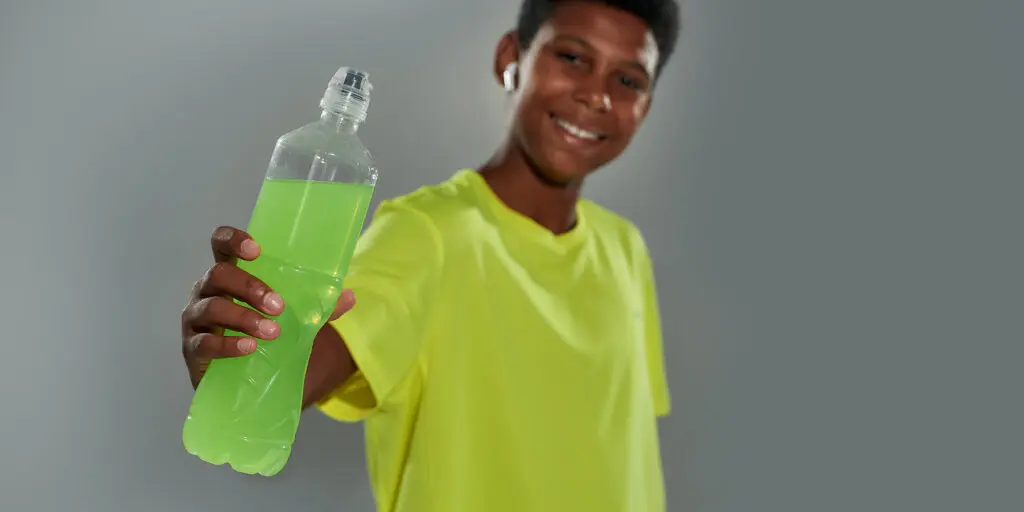Reviewed by Dr. Paul Rubin
You pack a sports drink to help your child power through practice, but that same drink could be quietly damaging their teeth. Sports drinks contain acids that gradually weaken enamel, the outer layer that protects teeth. Over time, this erosion can lead to sensitivity, discoloration, and lasting changes to your child’s smile.
The good news? With a few smart strategies, you can keep your young athlete hydrated and protect their teeth at the same time.
Table of Contents
Key Takeaway
Sports and energy drinks are highly acidic and can gradually weaken enamel, but with smart hydration habits and preventive dental care, parents can help protect their child’s teeth from long-term damage.
What is Enamel Erosion?
Enamel erosion happens when acids gradually dissolve the minerals that make enamel strong. This is not the same as damage from grinding or brushing too hard, which are mechanical problems.
Erosion is a chemical process. When the pH level in the mouth drops below about 5.5, the acids begin to soften enamel. Over time, this leads to thinning, sensitivity and discoloration.
Why Sports Drinks Are a Problem
Most sports drinks have a low pH, usually between 3 and 4, which means they are acidic enough to gradually soften enamel. They also contain sugar, which feeds bacteria in the mouth and produces even more acid.
Because kids often sip these drinks slowly during practices or games, their teeth are exposed to acid for longer periods than with a quick meal or snack. Even when sugar is not present, the acidity alone can still wear away the enamel.
| ⚠️ A Note on Energy Drinks Many teens reach for energy drinks for an extra boost, but these beverages can be even harder on teeth than sports drinks. With a pH around 2.5–3, they are highly acidic. Additives like citric acid prolong acid exposure, and caffeine reduces saliva flow, making it harder for the mouth to protect itself. Together, these factors put teeth at serious risk for enamel erosion. |
Signs of Enamel Erosion in Kids and Teens
Early enamel erosion can be easy to miss, but parents can spot warning signs by watching for:
- Sensitivity to cold drinks, air, or sweet foods
- Teeth that look more yellow as the enamel thins
- Front teeth with edges that appear translucent or “glassy”
- Small dents or shallow grooves on chewing surfaces
- Teeth that chip or crack more easily, even without injury
If you notice any of these changes, it is a good idea to schedule a dental checkup.
5 Simple Ways to Protect Your Child’s Smile
Sports drinks don’t have to be off limits completely. Here are a few simple changes you can make to protect their teeth:
- Choose water first. Make water the main drink for practices and daily hydration.
- Save sports drinks for game time. Offer them only during long or intense activities where electrolytes need to be replenished (especially in the Texas heat!).
- Skip the all-day sipping. Have your child finish the drink in one go to limit acid exposure.
- Rinse, then wait. Swish with water after finishing, and brush 30–60 minutes later.
- Chew xylitol gum. Sugar-free gum with xylitol boosts saliva, which helps defend teeth naturally.
Enamel Erosion Treatment in Prosper, TX
At Lonestar Kid’s Dentistry, we help families protect against enamel erosion and address early signs before they become bigger problems. Our pediatric dentists provide guidance, preventive care, and personalized treatment plans to keep your child’s smile healthy and strong.
To book an appointment at our pediatric dental office in Prosper, TX, call (469) 228-4402, request an appointment online, or visit us at 240 S. Preston Road, Suite 10 Prosper, TX 75078.
📍Other locations
Lonestar Kid’s Dentistry in Frisco, TX
Lonestar Kid’s Dentistry in McKinney, TX
FAQs
Electrolyte drinks can have a negative impact on dental health if consumed frequently or over long periods, mainly due to their high acidity and sugar content. If you drink them, make sure to rinse with water afterward, drink with a straw, and try to finish it in one sitting rather than sipping on it all day.
Enamel erosion is typically a slow, gradual process that can take many years to become noticeable. However, the speed of erosion is influenced by factors like the frequency of exposure to acids, a person’s diet, and individual saliva production.
If you live in Frisco, McKinney, or Prosper, you can schedule a visit with Lonestar Kid’s Dentistry. Our three locations offer preventive care, fluoride treatments, and enamel protection plans tailored for active kids and teens.
